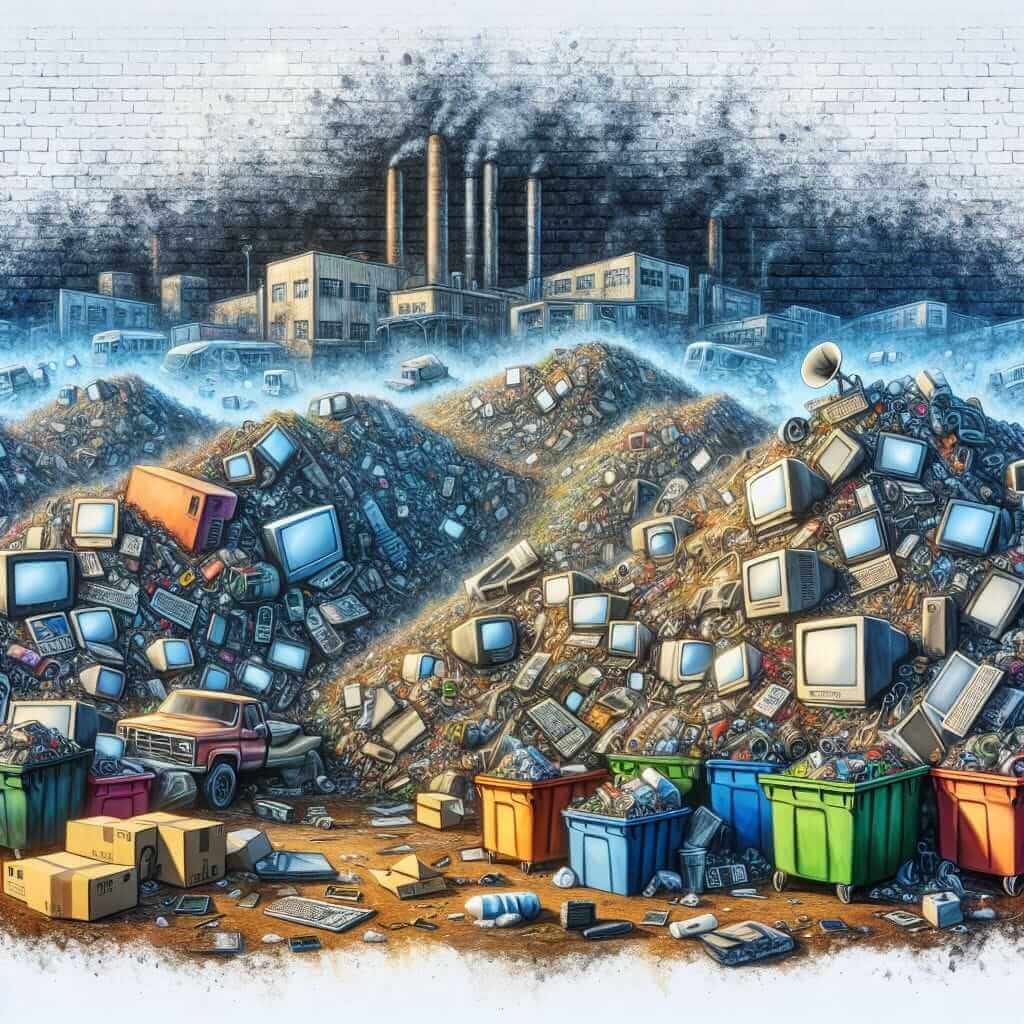“The impact of e-waste on the environment” is a pressing issue that frequently appears in IELTS Writing Task 2. This essay will delve into this topic, providing a sample answer, vocabulary analysis, and writing tips to help you craft a compelling response.
Here are some potential IELTS Writing Task 2 questions related to this topic:
- The rapid increase in electronic waste poses a significant threat to the environment. What are the causes of this problem, and what measures can be taken to address it?
- Some people believe that the responsibility for e-waste management lies solely with manufacturers, while others argue that consumers should also share the burden. Discuss both views and give your opinion.
- To what extent do you agree that technological advancements are the main contributor to the growing problem of electronic waste?
Sample Essay: The Impact of E-waste on the Environment
Let’s choose the first question as the basis for our sample essay:
The rapid increase in electronic waste poses a significant threat to the environment. What are the causes of this problem, and what measures can be taken to address it?
Essay Analysis
This question presents a classic problem-solution structure. You are asked to analyze the causes of the escalating e-waste issue and propose solutions to mitigate its environmental impact.
Sample Essay
The proliferation of electronic waste, often referred to as e-waste, presents a formidable environmental challenge in the 21st century. This essay will delve into the primary drivers behind this issue and explore viable solutions to curb its detrimental effects.
One of the leading causes of the burgeoning e-waste problem is the rapid obsolescence of electronic devices. The relentless pursuit of the latest smartphones, laptops, and other gadgets, fueled by aggressive marketing tactics and planned obsolescence, results in consumers discarding perfectly functional devices for newer models. This insatiable appetite for the latest technology leads to mountains of discarded electronics, placing a tremendous strain on landfills and waste management systems.

Another contributing factor is the lack of consumer awareness and inadequate recycling infrastructure. Many individuals are unaware of the hazardous components present in e-waste, such as lead, mercury, and cadmium, which can leach into the soil and water sources, posing severe risks to human health and ecosystems. Furthermore, the absence of accessible and efficient e-waste recycling facilities in many parts of the world exacerbates the problem, leading to improper disposal practices.
Addressing this complex issue demands a multifaceted approach. Governments and policymakers should implement stricter regulations on e-waste disposal, making manufacturers accountable for the entire life cycle of their products. Promoting extended producer responsibility programs, where manufacturers are responsible for collecting and recycling their products, can incentivize the development of more sustainable designs and reduce the amount of e-waste generated.
Moreover, raising public awareness about the environmental hazards of improper e-waste disposal is paramount. Educational campaigns can empower consumers to make responsible choices, such as extending the lifespan of their devices, opting for refurbished electronics, and properly recycling old ones through certified e-waste handlers.
In conclusion, the escalating e-waste crisis, driven by rapid technological advancements and inadequate waste management practices, necessitates a comprehensive response. By encouraging sustainable consumption patterns, strengthening regulations, and expanding recycling infrastructure, we can mitigate the environmental impact of e-waste and pave the way for a more sustainable future.
(Word count: 322)
Key Vocabulary and Notes
- Proliferation: Rapid increase or spread (noun) /proʊˌlɪfəˈreɪʃən/
- Formidable: Inspiring fear or respect through being impressively large, powerful, intense, or capable (adjective) /ˈfɔːrmɪdəbl/
- Obsolescence: The state of being no longer produced or used; out of date (noun) /ˌɒbsəˈlesəns/
- Relentless: Unceasingly intense (adjective) /rɪˈlɛntləs/
- Insatiable: Impossible to satisfy (adjective) /ɪnˈseɪʃəbl/
- Hazardous: Risky; dangerous (adjective) /ˈhæzərdəs/
- Leach: (Of chemicals or minerals) to be removed from soil, etc. by the action of rainwater (verb) /liːtʃ/
- Exacerbate: To make a problem, bad situation, or negative feeling worse (verb) /ɪɡˈzæsə(r)beɪt/
- Multifaceted: Having many different aspects or features (adjective) /ˌmʌltiˈfæsɪtɪd/
- Paramount: More important than anything else; supreme (adjective) /ˈpærəmaʊnt/
Conclusion
The issue of e-waste and its impact on the environment is a complex one, demanding thoughtful analysis and effective solutions. As you prepare for your IELTS exam, remember to practice writing essays on similar environmental topics. Familiarize yourself with relevant vocabulary and grammatical structures to articulate your ideas clearly and persuasively. Good luck with your IELTS preparation!